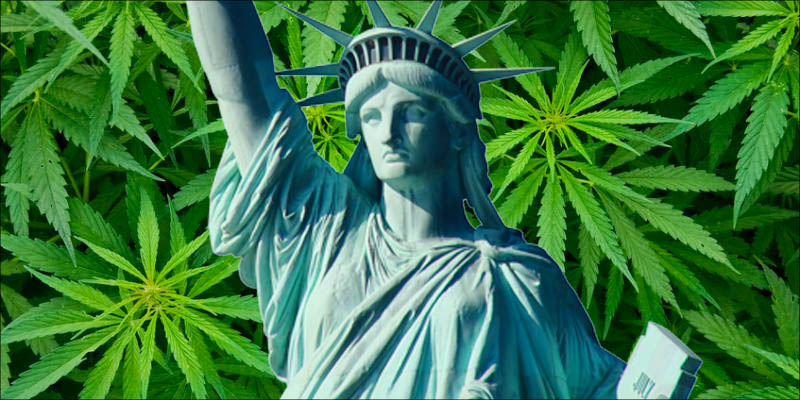New York’s medical cannabis tax revenue could help revive disrupted economy
A virus has swept across the globe, leaving a trail of destruction in its wake; COVID-19 is a deadly strain of coronavirus that has affected almost two million people in 210 countries and territories across the globe. The economic impact of COVID-19 has – and continues to – devastate global industries. However, the cannabis industry could potentially reverse some damage caused by the pandemic.
This is according to analyst for DataTrek Research, Jessica Rabe. Recent analysis of the coronavirus crisis and its prospective implications on U.S. cannabis industry growth was recently published by Rabe in a note. She believes legal weed could help salvage companies, industries and states/territories that have been dealt a blow in revenue.
“There’s a simple and effective solution for states and cities to help cover their huge budget shortfalls after the COVID-19 pandemic subsides: legalize recreational sales of [cannabis],” says the expert. She makes a good point, considering the fact that dispensaries in many legal states have been dubbed “essential business” during the emergence of COVID-19.
At the current time – as per the U.S. federal government’s ruling – the cannabis plant remains an illegal substance. It is categorized in the same Schedule 1 narcotics list as many dangerous and addictive drugs; including heroin, LSD and cocaine. Although illegal at the federal level, cannabis has been legalized in 33 states and Washington, D.C for medical purposes, with 11 of those states and Washington, D.C also having legalized recreational sale and consumption.
Cannabis tax revenue in New York may prove beneficial for restoring economic damage
Economic damage has been felt the most in New York, which has been described as the “epicenter of COVID-19 cases in the U.S.” Revenue earned by the state of New York is expected to sink somewhere in the range of $4 billion-$7 billion as a direct effect of the pandemic. This is according to New York State Comptroller Thomas P. DiNapoli, who serves as the State’s chief fiscal officer; responsible for providing oversight for everything related to state and local government taxes.
Analysts have drawn attention to the fact that state and local governments may encounter a slump in tax revenue due to the COVID-19 pandemic. With this in mind, Rabe and her team chose to explore the way(s) in which the virus may cause ordinary life to undergo considerable change and also, how economic problems could be resolved.
“We’ve been thinking a lot about how life will change post-virus, and one big difference will be that state and local governments are going to encounter large unexpected tax receipt shortages,” wrote Rabe, who has her eyes focused on adult-use cannabis legalization in New York. “That’s particularly true when it comes to sales and income taxes amid stressed consumer balance sheets and massive layoffs. And, unlike the Federal government, states can’t print unlimited amounts of money.”
Should the plant be legalized for recreational sale and consumption in New York, she affirms that tax revenue could be hiked up. In comparison with income tax, Rabe says that cannabis legalization could effectively raise tax revenue without pushing New Yorkers to move out-of-state. Her confidence that cannabis legalization in New York could reverse the economic damage caused by COVID-19 stems from the fact that “hundreds of millions of dollars annually in states like Colorado” has already been raised through tax revenue.
“If Colorado can raise +$300 million from recreational and medical [cannabis] sales in a year, New York can certainly earn over $1 billion as long as the state taxes and regulates adult-use sales reasonably,” said Rabe.
New York Gov. Andrew Cuomo is also supportive of legalization, but he has not yet been victorious in his attempts to pass such a law. Notwithstanding Cuomo’s recent statement that legalization is “not likely” as part of the state’s budget process, analysts predict that New York could pull in annual revenue to the amount of $1.3 billion if a law is passed. This is certainly feasible, what with a medical cannabis market already having been established; dispensaries began selling medical cannabis in New York back in 2016. The existing infrastructure means that the rollout of a recreational market shouldn’t be overly complex or time-consuming.
Numerous U.S. states could legalize cannabis to recover from damage caused by COVID-19
In summary, not only does Rabe consider the COVID-19 pandemic a stimulus for cannabis legalization in New York but also, various other states across the U.S. Examples of some states that were already considering cannabis legalization in 2020 include Arizona, Nebraska and New Jersey.
Aside from giving these states a push for legislation to be enacted, some other “red zones” could be prompted to amend their drug laws in the aftermath of COVID-19. Business closures mean that revenue and job losses will be abundant, therefore driving the need to earn more tax revenue across the U.S.
“The economic impact from this virus may be enough for some states, such as New York, to finally get enough votes to pass such legislation,” Rabe continued. “While we recognize legal [cannabis] is a controversial topic for many people, the budget shortfalls that COVID-19 will create may sway opinions about the issue.”








